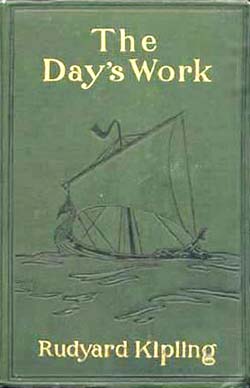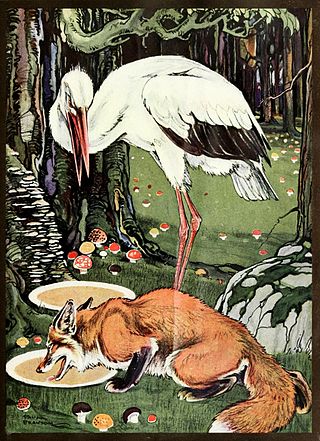
Joseph Rudyard Kipling was an English novelist, short-story writer, poet, and journalist. He was born in British India, which inspired much of his work.
This is a bibliography of works by Rudyard Kipling, including books, short stories, poems, and collections of his works.

The Jungle Book (1894) is a collection of stories by the English author Rudyard Kipling. Most of the characters are animals such as Shere Khan the tiger and Baloo the bear, though a principal character is the boy or "man-cub" Mowgli, who is raised in the jungle by wolves. The stories are set in a forest in India; one place mentioned repeatedly is "Seonee" (Seoni), in the central state of Madhya Pradesh.

John Lockwood Kipling was an English art teacher, illustrator and museum curator who spent most of his career in India. He was the father of the author Rudyard Kipling.

The Barrack-Room Ballads are a series of songs and poems by Rudyard Kipling, dealing with the late-Victorian British Army and mostly written in a vernacular dialect. The series contains some of Kipling's best-known works, including the poems "Gunga Din", "Tommy", "Mandalay", and "Danny Deever", helping consolidate his early fame as a poet.
"The law of the jungle" is an expression that has come to describe a scenario where "anything goes". The Oxford English Dictionary defines the Law of the Jungle as "the code of survival in jungle life, now usually with reference to the superiority of brute force or self-interest in the struggle for survival".

The Idler was an illustrated monthly magazine published in Great Britain from 1892 to 1911. It was founded by the author Robert Barr, who brought in the humorist Jerome K. Jerome as co-editor, and its contributors included many of the leading writers and illustrators of the time.

Plain Tales from the Hills is the first collection of short stories by Rudyard Kipling. Out of its 40 stories, "eight-and-twenty", according to Kipling's Preface, were initially published in the Civil and Military Gazette in Lahore, Punjab, British India between November 1886 and June 1887. "The remaining tales are, more or less, new."

"Mandalay" is a poem by Rudyard Kipling, written and published in 1890, and first collected in Barrack-Room Ballads, and Other Verses in 1892. The poem is set in colonial Burma, then part of British India. The protagonist is a Cockney working-class soldier, back in grey restrictive London, recalling the time he felt free and had a Burmese girlfriend, now unattainably far away.

Naulakha, also known as the Rudyard Kipling House, is a historic Shingle Style house on Kipling Road in Dummerston, Vermont, a few miles outside Brattleboro. The house was designated a National Historic Landmark in 1993 for its association with the author Rudyard Kipling (1865–1936), who had it built in 1893 and made it his home until 1896. It is in this house that Kipling wrote Captains Courageous, The Jungle Book, The Day's Work, and The Seven Seas, and did work on Kim and The Just So Stories. Kipling named the house after the Naulakha Pavilion, situated inside Lahore Fort in present-day Pakistan. The house is now owned by the Landmark Trust, and is available for rent.
"Submarines" is a poem written by Rudyard Kipling (1865-1936), and set to music by the English composer Edward Elgar in 1917, as the third of a set of four war-related songs on nautical subjects for which he chose the title "The Fringes of the Fleet".

The Day's Work is a collection of short stories by Rudyard Kipling. It was first published in 1898. There are no poems included between the different stories in The Day's Work, as there are in many other of Kipling's collections.
The Indian Railway Library was an enterprise conducted in Allahabad from 1888. It was a publishing venture of A. H. Wheeler & Co., who "had the monopoly on bookstall sales on Indian railway stations" It was a series of pamphlets intended to catch the interest of railway passengers, and offer cheap "throwaway" reading material.
Sea to Sea or From Sea to Sea may refer to:

Paul Bransom was an American painter, cartoonist, and illustrator of animals.
"The Ship that Found Herself" is a short story by Rudyard Kipling, first published in The Idler in 1895. It was collected with other Kipling stories in The Day's Work (1898).
The Cruise of the Cachalot is an 1898 semi-autobiographical travel narrative by Frank T. Bullen that depicts a whaling expedition from a seaman's perspective. After its initial publication, the book sold well amongst readers, and was well liked. The work was included on a number of early 20th century primary and secondary school reading lists, and Rudyard Kipling's letters include reference to his having read the work with his children.

"A Matter of Fact" is a short story by Rudyard Kipling, first appearing in January 1892 in the magazine People. It was published the next year in the collection Many Inventions.
"In the Neolithic Age" is a poem by the English writer Rudyard Kipling. It was published in the December 1892 issue of The Idler and in 1896 in his poetry collection The Seven Seas. The poem is the source of the quotation: "There are nine and sixty ways of constructing tribal lays, / And every single one of them is right."
Robert Thurston Hopkins (1884–1958) was a British writer and ghost hunter.










